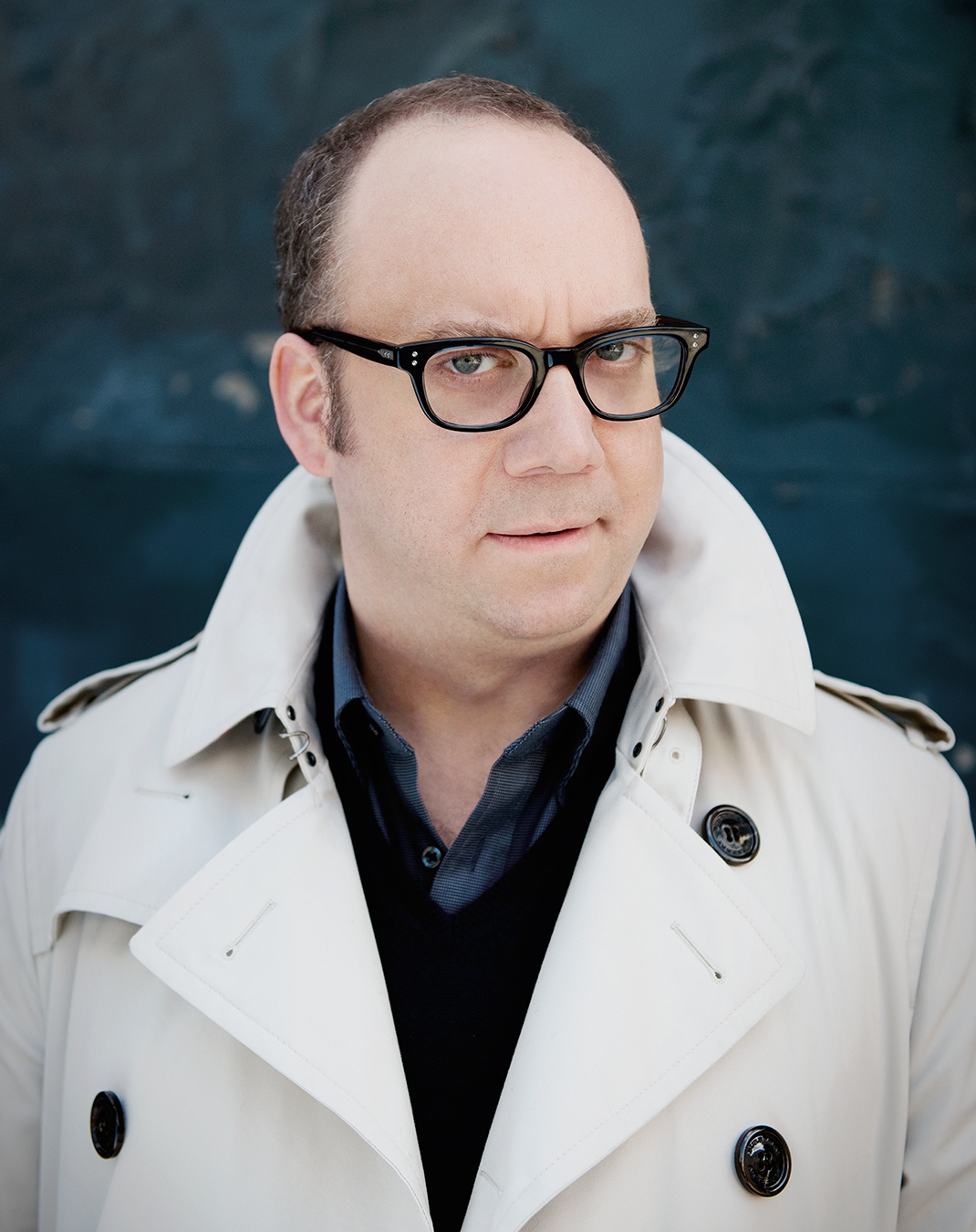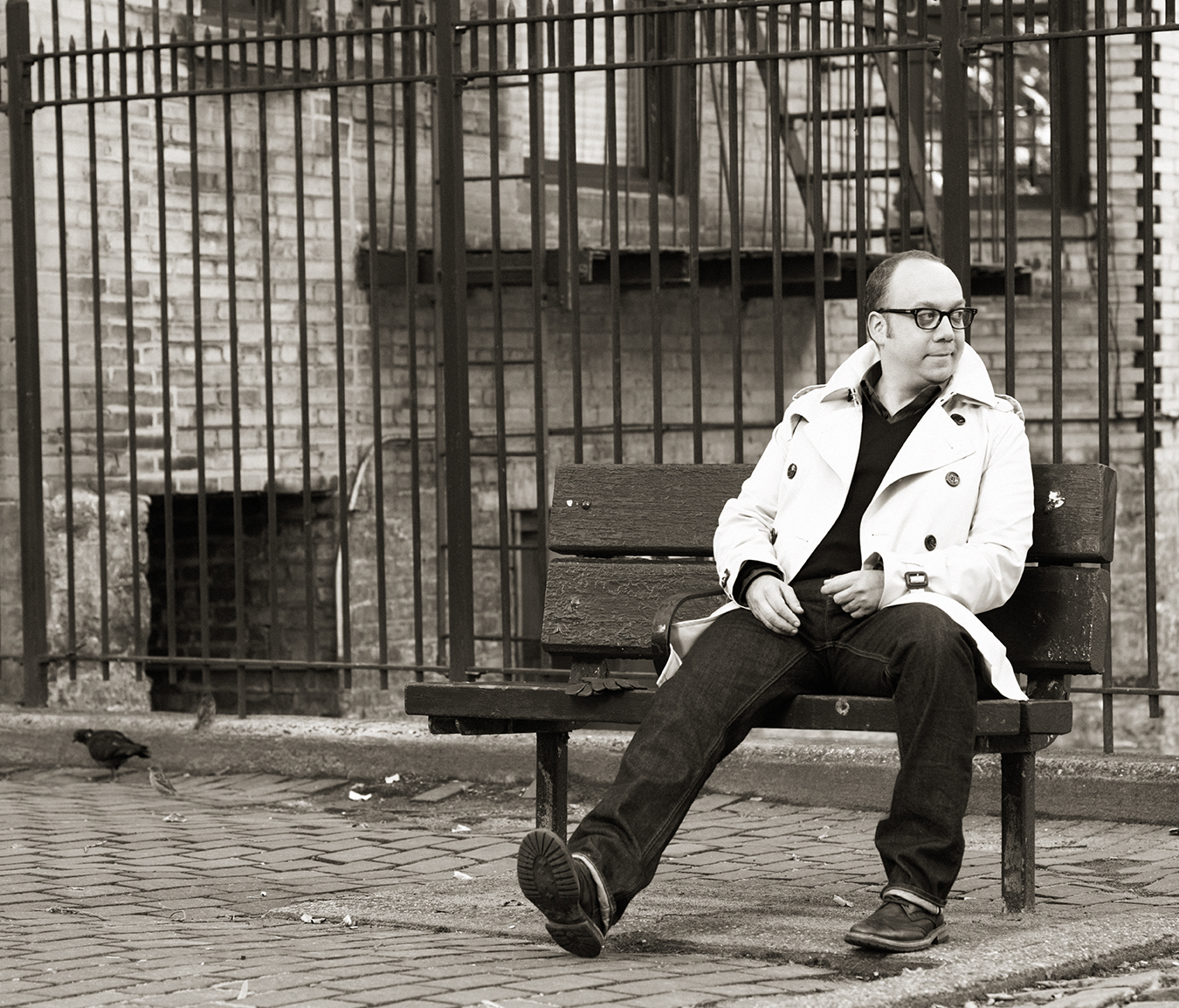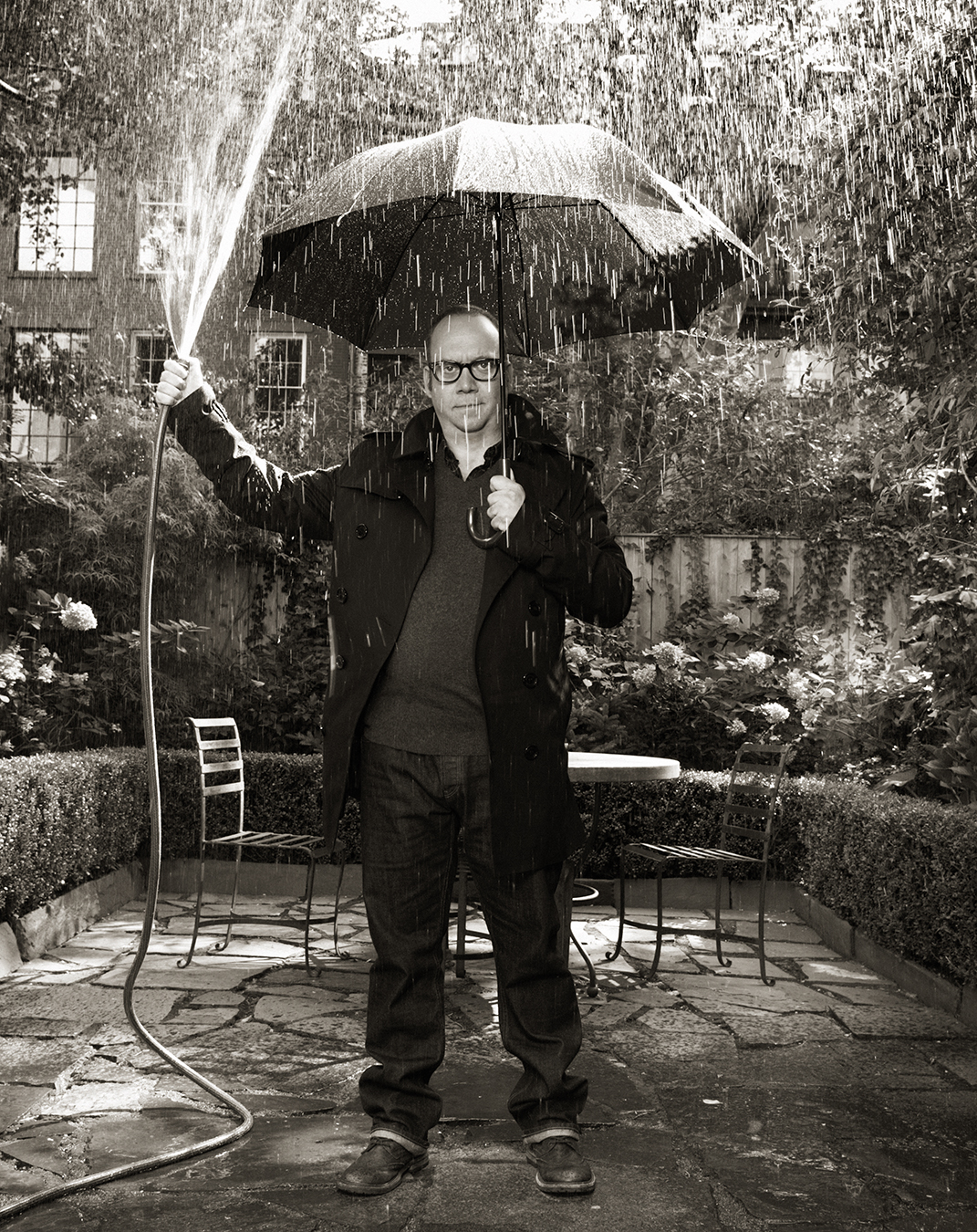-

Giamatti wears a Burberry trench and sweater, A.P.C. shirt, and his own glasses.
-

Giamatti wears a Burberry trench, sweater, and jeans, A.P.C. shirt, Billy Reid boots, and his own glasses. Paul Smith gloves on bench.
-

Giamatti wears Burberry trench coat, sweater, shirt, and jeans, Billy Reid boots, and his own glasses. Umbrella from Uniqlo.
Paul Giamatti
Leading man.
Although he loves the work, Paul Giamatti doesn’t like all of the trappings that come with the fame of being a recognizable actor. The fuss sometimes baffles him, especially when it comes to fans.
“It’s just a strange experience that people recognize me,” says the 43-year-old actor. “I find it really odd. Half the time, people can be so intimate with you when they see you; I always think, ‘I know this person from high school and I’ve just forgotten who they are.’”
On occasion, these encounters can be more than a little unusual. “I had a guy once chase me down the street on Fifth Avenue in New York in the middle of traffic to get my autograph,” he says. “And I mean tearing after a car that I was in, and it was slightly cruel because I kept driving just to see if this guy was going to keep chasing me. And he was really running—I mean, Fifth Avenue in the middle of the day is dangerous. He was flying down the street and he didn’t stop until I stopped, and then he came up and got the autograph. It was really crazy. His determination to get it seemed just so bizarre to me. That it would be so worth it to him that he would almost be hit by a fucking car was really bizarre to me.
“Some very weird woman came up to me in L.A., and she had a fish that she talked to. I had a guy give me a weird bag of pills one day. Oh, I’ve had people give me weird.”
In Barney’s Version, an adaptation of Mordecai Richler’s novel of the same name, Giamatti plays Barney Panofsky, an irascible, self-indulgent television producer from Montreal who suffers from Alzheimer’s. Panofsky retells the story of his reckless life: his three marriages, his relationship with his father, and why he became a suspect in the death of his best friend Bernard “Boogie” Moscovitch.
There may have been some questions when Robert Lantos, producer of Barney’s Version (which is being distributed in Canada by Entertainment One Canada for release in Toronto and Montreal on December 24 and nationwide in January), cast an American to play the title role in a quintessentially Canadian story. (“I don’t want to be the guy that screws up the Canadian national treasure,” says Giamatti, laughing.) And the actor was initially apprehensive in accepting the role. “I think I may have even said to [the producers], ‘There’s not a Canadian actor you want to do this—because you’re sure you want to have an American doing this iconic Canadian thing?’”
But Lantos, who says that Giamatti is “one of the greatest actors working on film today—anybody who has seen him knows that,” recognized that the role required an actor with extraordinary emotional range; an actor who can play the endearing scoundrel, but also show the audience Barney’s vulnerabilities, all of which was more important to him than nationality.
Giamatti has reached the top of his profession in a rather atypical way, especially for someone working in Hollywood. He says, “Somebody once asked me, ‘You play these guys and they’re not attractive guys in [many] senses of the word a lot of the times—where’s your vanity?’ I said that my vanity is not being vain. This is what I can give as an actor, actually not being the perfect-looking guy or the perfect-seeming guy.” In Barney’s Version and other films, he has leveraged his less-than-leading-man looks and his extraordinary talent for showcasing the struggles of the ordinary man. He has carved out a niche playing the likeable curmudgeon.
“My vanity is not being vain. This is what I can give as an actor, actually not being the perfect-looking guy or the perfect-seeming guy.”
The key word, however, is has. With roles in a number of significant films in the 1990s (including Saving Private Ryan, The Truman Show, and Man on the Moon), he established himself as a venerable character actor. But since his breakout role in Sideways, for which he received widespread acclaim for portraying a man withdrawn from life and hiding behind his oenophile hobby, yet struggling to reconnect, he’s delved into more (and more varying) lead roles.
“[Supporting and starring roles are] totally different kinds of things. They make different demands on me,” he says. “Playing a supporting thing, it’s very different muscles that you use. The supporting stuff is harder to do in some ways because you have to come in and work in bursts, but oftentimes in the supporting parts you’re given permission to be eccentric and vivid, and you’re supposed to be. It’s just a different muscle.”
Giamatti researches roles meticulously, though the nature of the research depends on the project. While researching former United States president John Adams for the television miniseries John Adams, he had an overwhelming amount of material at his disposal: books about Adams, letters between Adams and his wife, John Adams’s library, even books about the period. However, with a film like Cold Souls, a movie about a tortured New York actor who puts his soul in cold storage and discovers that Russian mobsters have stolen it, there wasn’t directly correlating research to be done. Instead, Giamatti read Russian authors and science fiction books to put him in the right mood.
Giamatti credits his father, who passed away in 1989, for his own strong work ethic. Bart Giamatti was a professor of literature at Yale University and became the youngest president of the university since the 18th century (he was 39). When Bart became president of Yale, he joked that the only thing he really wanted to be was president of the American League. And he got close. In 1986, he was appointed president of the National League. Three years later, he became commissioner of baseball and gained notoriety when he banned Pete Rose from the game. Of his father’s attitude toward work, Giamatti says, “He was pretty much all about enjoying what you’re going to do with yourself and being serious about it. If you’re going to do something like [acting], you’re really going to work at it, not do it as a lark. You didn’t treat things frivolously, even if you did something frivolous.”
For his efforts, Giamatti has been rewarded. He has been nominated for an Academy Award and a Golden Globe for his role in Cinderella Man, a performance which also garnered him a SAG Award and a Broadcast Film Critics Association Award for best supporting actor. He also scooped up an Independent Spirit Award for his role in Sideways, and an Emmy, a Golden Globe, and a SAG Award for John Adams.
Although his success is laudable, what’s most interesting about Giamatti is that despite these accomplishments, he is completely without pretension.
Giamatti says that’s his father’s influence, once again. “My dad was a really unaffected guy, considering the world he was in. So I probably took some of that from him.” Also, though his family enjoyed acting and found it enriching—his mother, Toni, acted before she taught at Hopkins School in Connecticut, and his older brother, Marcus, became an actor—they were not reverential about it. “The acting profession, I never thought it was some hugely dignified thing. It’s not really,” Giamatti says. Acting was something he fell into because he enjoyed doing it and was able to make a living at it.
Giamatti attended Yale and graduated in 1989 with a degree in English. (When asked about the rumour that he was a member of the notoriously secretive Skull and Bones society, he is cagey. “It’s an interesting thing,” he says. “I don’t know where that came from … I don’t want to say one way or the other whether I was, which of course, most people automatically say, well, I must have actually been. But I like being cagey about it because people keep bringing it up.”) Giamatti considered a career in academics and also thought about going into the visual arts, as he used to draw and paint. He just decided to give acting a try.
“I’m happy to have one scene in a movie as long as it’s an interesting scene … I don’t care if I have one line, as long as it’s a great line.” Giamatti’s main criterion is that he doesn’t want to be bored.
He moved to Seattle to toil away in regional theatre. “I don’t even think you could dignify it by calling it regional theatre. It was pretty low-rent, black box, really gritty stuff,” he explains. When an agent approached him after seeing him in a play, he agreed to sign on. To his surprise, he actually started making money from acting. His parents were supportive of his career choice, which wasn’t unexpected to him because he grew up in a university environment, “a big liberal arts sort of place.” After four years in Seattle, he returned to his alma mater to do a master’s degree in fine arts from the Yale School of Drama. After completing graduate school, he moved to New York and ended up on Broadway, and, in the early 1990s, made the transition to film.
Giamatti’s journeyman’s view of the acting profession serves him well in that his self-esteem isn’t tied to a good review. Lady in the Water, in which Giamatti portrayed the manager of an apartment complex who rescues a woman from another world, tanked commercially and critically. Giamatti agrees the movie has problems but takes a philosophical view of the bad reviews. “It happens. What are you going to do about it?” And he doesn’t regret making the movie.
He focuses on choosing roles that are interesting to him as an actor. Regarding his next project, he says, “I think I’m doing a movie called Too Big to Fail in New York, which is all about the Lehman Brothers and Goldman Sachs and the financial crash.”
Giamatti doesn’t have a preference for a lead or supporting role, just as long as it’s a good part. “I’m happy to have one scene in a movie as long as it’s an interesting scene … I don’t care if I have one line, as long as it’s a great line.” His main criterion is that he doesn’t want to be bored.
Which explains his interest in the character of Barney. “I get to do everything with this character,” he says. “He goes through every mood and you get to hit all the big moments in a person’s life. Three marriages and kids and death and my own death and other people’s death. You get to hit all the big themes.”
While he’s at home in New York, Giamatti enjoys spending time with his wife, Elizabeth, and his nine-year-old son, Sam. He likes to take his son to karate lessons and check out neighbourhood restaurants. He follows the Red Sox casually. He describes his wife, whom he met at graduate school and married in 1997, as grounded, and says that’s what attracted him to her. She provides stability and she’s more social than Giamatti, who describes himself as more of an introspective person.
What they have—and what he values so much—is a sane, normal home life. “I don’t have big hobbies. I don’t fly a plane or anything like that. I’m pretty stay-at-home-y,” he admits. Giamatti’s home life is a counterpoint to (and also respite from) his very public career.
Which partly explains the impetus for playing coy about a certain secret society. “I don’t want to confirm or deny because I just think it’s kind of funny,” he says when pressed one last time about the Skull and Bones. “Who knows? It’s the only kind of mysterious thing I have about me,” he says. But he pointedly ignores the fact that—as producers, directors, casual viewers, and enthusiastic fans (with or without talking fish) can attest—his charisma and talent make him anything but normal. Down-to-earth? Yes. Accessible? For sure. Talented? Unquestionably, and incomparably.
Styling by Mark Holmes for See Management. Grooming by Fabiola Arancibia for the Wall Group.




